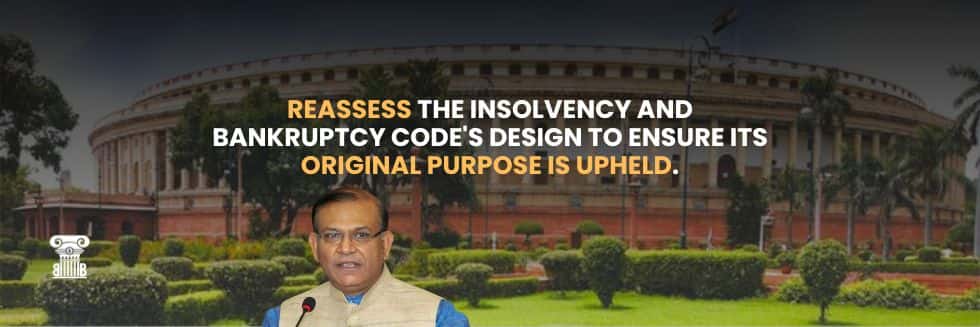The 67th report titled Action Taken by the Government on the Observations/Recommendations contained in the Thirty-second Report (17th Lok Sabha) on the subject ‘’Implementation of IBCA-Pitfalls and Solutions” was recently released. The committee, led by Shri Jayant Sinha, comprised members from both the Lok Sabha and Rajya Sabha, supported by a Secretariat.
The report highlighted several key issues and recommendations. One of the primary concerns was the appointment of fresh graduates as Insolvency Professionals (IPs) or Resolution Professionals (RPs). The committee questioned their ability to manage large and complex corporations and suggested stricter criteria for their appointment.
The committee also proposed the establishment of an Institute of Resolution Professionals to regulate the conduct of RPs. This self-regulatory body, akin to the Institute of Chartered Accountants of India (ICAI), would ensure adherence to standards and fair self-regulation.
Recognizing the importance of entities like IPs, IP Agencies, and Information Utilities, the committee recommended periodic capacity enhancement programs to ensure their continuous development.
The report also advocated for specialized benches in the National Company Law Tribunal (NCLT) for matters related to the Insolvency and Bankruptcy Code (IBC) and Micro, Small, and Medium Enterprises (MSMEs). It emphasized the need for institutional capacity enhancement for NCLT benches to handle sector-specific cases effectively.
The committee expressed concern over vacancies in the NCLT and inadequate training for its members. It recommended swift recruitment to fill sanctioned positions and collaboration with National Law Schools for enhanced training and capacity-building efforts.
To prevent misuse and abuse of insolvency processes, the committee recommended ensuring finality within statutorily stipulated periods. It called for stricter adherence to timelines by all stakeholders involved, alongside amendments to streamline processes and remove bottlenecks.
The committee suggested a review of the design of the IBC based on observed delays and shortcomings in the resolution process. It called for addressing gaps and roadblocks to ensure the code’s purpose of timely insolvency resolution and asset value maximization was upheld.
The report’s fleeting reference to revising the code’s design prompts introspection into whether the persistent issues plaguing the IBC process, notably delays in resolution and suboptimal value realization, stem from inherent flaws within the legislation. Despite numerous amendments since its inception in 2016, the core question remains: Does the IBC require structural modifications to address its inherent shortcomings adequately? While legislative amendments have been made, the primary emphasis should be on rectifying governance deficiencies, at least for the time being. The committee sought clarification on steps taken to expedite claim admission processes.
In conclusion, the Action Taken Report on IBC, 2024 provides a comprehensive review of the current state of the IBC and offers valuable recommendations for its improvement. It remains to be seen how these recommendations will be implemented and what impact they will have on the insolvency resolution process in India.
